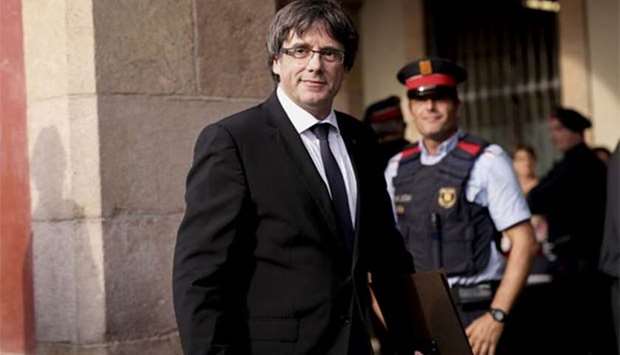The Spanish government and the European Union warned Catalonia's separatist leader on Tuesday against declaring independence, shortly before he announces a possible split from Spain under intense domestic and European scrutiny.
Catalan president Carles Puigdemont arrived at the regional parliament in Barcelona under the glare of cameras from around the world, ready to address lawmakers.Whether or not he will follow through on his threat to announce a full breakaway in defiance of the central government and Spanish courts is still unknown.
But in Madrid, the Spanish government issued a sharp warning to Puigdemont as it grapples with the nation's worst political crisis in a generation.
"We call on Puigdemont not to do anything irreversible, not to pursue a path of no return and not to make any unilateral independence declaration," government spokesman Inigo Mendez de Vigo told reporters.
EU President Donald Tusk also urged Puigdemont against making a decision that would make "dialogue impossible".
Police increased security around the parliament, blocking public access to a park that houses the building.
As police helicopters flew overhead, several thousand independence supporters gathered not far from parliament to watch proceedings on two giant screens.
Some 30 tractors driven by farmers from the region also came in support of independence, decorated with the Catalan separatist flag, some with signs reading "democracy."
At stake is the future of a region of 7.5 million people deeply divided over independence, one of Spain's economic powerhouses whose drive to break away has raised concern for stability in the European Union.
Political leaders in Catalonia, Spain and Europe have come out against an independence declaration, concerned over the country's biggest upheaval since its transition to democracy in the 1970s.
Prime Minister Mariano Rajoy has vowed to use everything in his legal power to prevent independence and has even refused to rule out imposing direct rule over the semi-autonomous region -- an unprecedented move many fear could lead to unrest.
And Spain's deputy prime minister Soraya Saenz de Santamaria once again rejected mediation.
"There is no room for mediation between legality and illegality, between the law and contempt of the law, between democracy and tyranny," she told the upper house Senate during a tense debate on Tuesday.
But the Catalan president says the independence referendum that took place on October 1 despite a court ban justifies splitting from Madrid.
Around 90% of those who cast ballots voted for independence but the poll was poorly monitored and many Catalans opposed to secession boycotted an illegal plebiscite that was witnessed a violent police crackdown.
On Monday, Ada Colau, the popular mayor of Barcelona, warned that a unilateral declaration of independence would put "social cohesion" at risk.
Pro-unity and pro-independence supporters have staged mass rallies in Barcelona over the past week, highlighting divisions in Catalonia.
Anger over the police violence during the referendum swung some Catalans over to the independence camp.
But both Madrid and the Catalan executive have come under fire for their dogged response to the crisis and a lack of dialogue.
Carolina Palles, a 53-year-old flower vendor in Barcelona's popular La Ramblas boulevard, said it was "a sad day", almost two months after the seaside city was hit by a deadly terror attack.
Against independence, she was angry at both camps.
"Rajoy's government handled things very badly," she said, accusing the separatists "of persisting until the very end, like martyrs".
Short of declaring an outright split in his speech, the Catalan leader could play for time and call for dialogue, or back down outright from his secessionist demands.
EU nations are watching developments closely amid concern that Catalan independence could put further pressure on the bloc still dealing with the fallout from Britain's shock decision to leave.
The crisis has also caused deep uncertainty for businesses in one of the wealthiest regions in the eurozone's fourth largest economy.
A string of companies have already moved their legal headquarters -- but not their employees -- from Catalonia to other parts of the country.
Demands for independence in Catalonia, which has its own language and cultural traditions, date back centuries.
But a 2010 move by Spain's Constitutional Court to water down a statute that gave Catalonia additional powers, combined with a deep economic meltdown in Spain, sparked a surge in support for independence.

